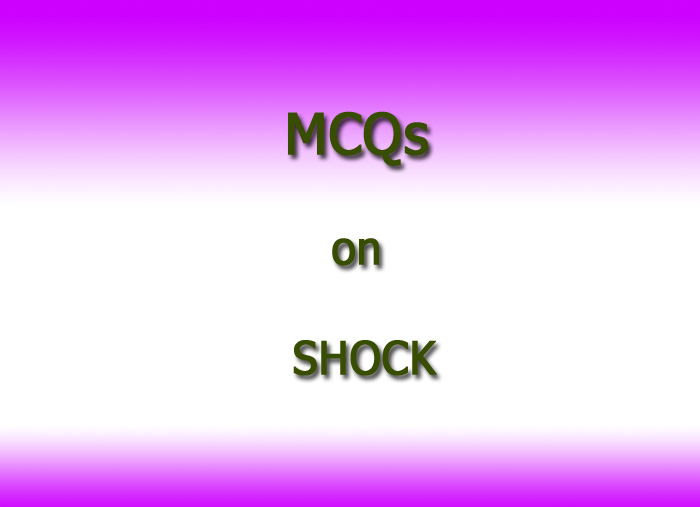- NEED HELP? CALL US NOW
- +919995411505
- [email protected]

1. Shock (mean BP less than 60 mmHg) can be caused by:
A. Low intravascular volume
B. Low cardiac output
C. Pleural effusion
D. Decreased peripheral vascular resistance
Answer:B
2. A 30 year old man is admitted to the Emergency Ward with sudden onset of severe shortness of breath, no chest pain, diffuse wheezing, cyanosis, and a BP of 70/30, Pulse = 100. This event occurred soon after a meal. What is the likely diagnosis:
A. Acute pulmonary embolism
B. Tension pneumothorax
C. Anaphylaxis
D. Myocardial infarction
Answer:C
3. In a subject in shock with low body temperature, cold and clammy extremities, low urine output, and elevated lactic acid level in the blood, the most likely cause of shock is:
A. Asthma
B. Pulmonary embolism
C. Sepsis
D. CHF
Answer:C
4. In shock, the hydrostatic pressure …………. & oncotic pressure is constant:
A. Constant
B. No changes
C. Decreases
D. Increases
Answer:C
5. A 82–year-old diabetic is involved in an automobile accident, with severe thoracic and abdominal traumatic injuries. He is rushed to the hospital and placed in the intensive care unit. After a few hours, there is the rapid onset of myocardial dysfunction, hypotension, disseminated intravascular coagulation, and coma. This sequence of events most closely mimics what type of shock:
A. Septic (Distributive)
B. Cardiogenic
C. Anaphylactic
D. Neurogenic
Answer:A
6. It’s not C or D (no head injury). It’s not primarily cardiogenic (B), because they don’t describe symptoms of heart failure. Hypovolemic shock wouldn’t cause DIC (or probably even myocardial dysfunction).
7. In hypovolemic shock the decreased in CO is due to :
A. Inadequate blood/plasma volume
B. Reduced venous return
C. Failure of myocardial pump
D. A&B
Answer:D
8.The CO is normal or elevated in which of shock types:
A. Hypovolemic shock
B. Cardiogenic shock
C. Distributive shock
D. Obstructive shock
Answer:C
9.The heart pump is well but there is peripheral vasodilation:
A. Hypovolemic shock
B. Cardiogenic shock
C. Distributive shock
D. Obstructive shock
Answer:C
10.The heart fails to pump blood out:
A. Hypovolemic shock
B. Cardiogenic shock
C. Distributive shock
D. Obstructive shock
Answer:B




